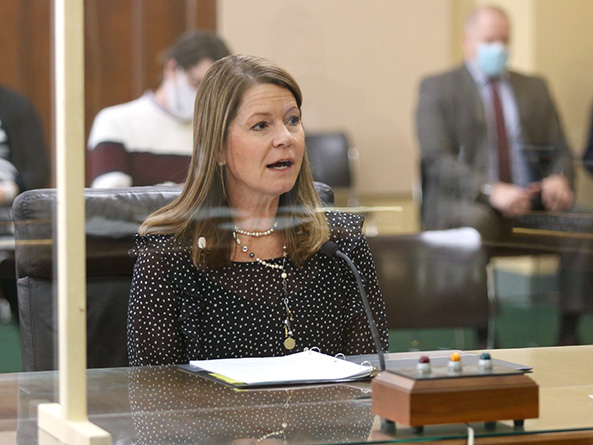Bill would provide mental health commitment data
First responders could be notified of a person’s prior mental health treatment when responding to a service call under a bill heard Feb. 3 by the Judiciary Committee.

LB663, sponsored by Lincoln Sen. Suzanne Geist, would require the state Department of Health and Human Services to collect and transfer the personal identification data of any person placed into the custody of DHHS for court-ordered mental health treatment to the Nebraska Commission on Law Enforcement and Criminal Justice.
The commission then would create an indicator within its information system to note that the person was ordered to inpatient treatment and committed to the custody of DHHS.
Under the bill, emergency dispatch operators and other personnel designated by the commission would have access to the indicator.
Geist said she worked with local elected officials, law enforcement and behavioral health professionals to identify ways to protect an individual’s privacy while also providing law enforcement a tool to assist in responding to potential crisis situations.
“[We] sought to find a pathway to protect both law enforcement officers and those who are struggling with a mental health crisis when law enforcement is called,” she said. “This scenario is becoming more and more common and we were looking for a way to make sure these interactions provide the best and safest outcome for all involved.
Lancaster County Commissioner Deb Schorr testified in support of LB663. The proposal is a work in progress, she said, but a step in the right direction for all parties involved.
“Lancaster County strongly believes that having this indicator in place will allow law enforcement and select other persons who work within the criminal justice system access to valuable information to provide the most appropriate and caring response to those in crisis and safely resolve possibly dangerous situations,” Schorr said.
Kim Etherton, director of Lancaster County Community Corrections, also supported the bill. Without access to behavioral health information at the point of contact, she said, law enforcement may miss an opportunity to place a person in a pre-trial diversion program.
“Law enforcement may encounter an individual in the community while on a call for service that dispatch reports has a current or previous mental health commitment,” Etherton said. “If there is cause for citation or arrest, accurate information about this individual’s behavioral health history will direct referral to the most appropriate intervention.”
Opposing LB663 was Brad Meurrens of Disability Rights Nebraska. He said the bill would stigmatize and discriminate against individuals with mental health issues and could create an unnecessarily tense situation for first responders.
“It imposes a permanent identifier on the people with mental health histories based on the simplistic and wrong-headed assumption that people with mental illnesses are inherently and permanently dangerous,” Meurrens said. “Just because a person has been committed even once should not automatically label them as deviant, as this bill does.”
Sheri Dawson, director of the DHHS Division of Behavioral Health, also opposed the bill. Mental health involuntary treatment is protected information under HIPPA, she said, yet LB663 would allow transfer of this information to emergency dispatch operators and others.
“While the bill states that procedures should be established that guarantee that no information is released beyond what is necessary, the ‘need to know’ and intended use of protected health information is not clearly and explicitly stated,” Dawson said.
The committee took no immediate action on the bill.


